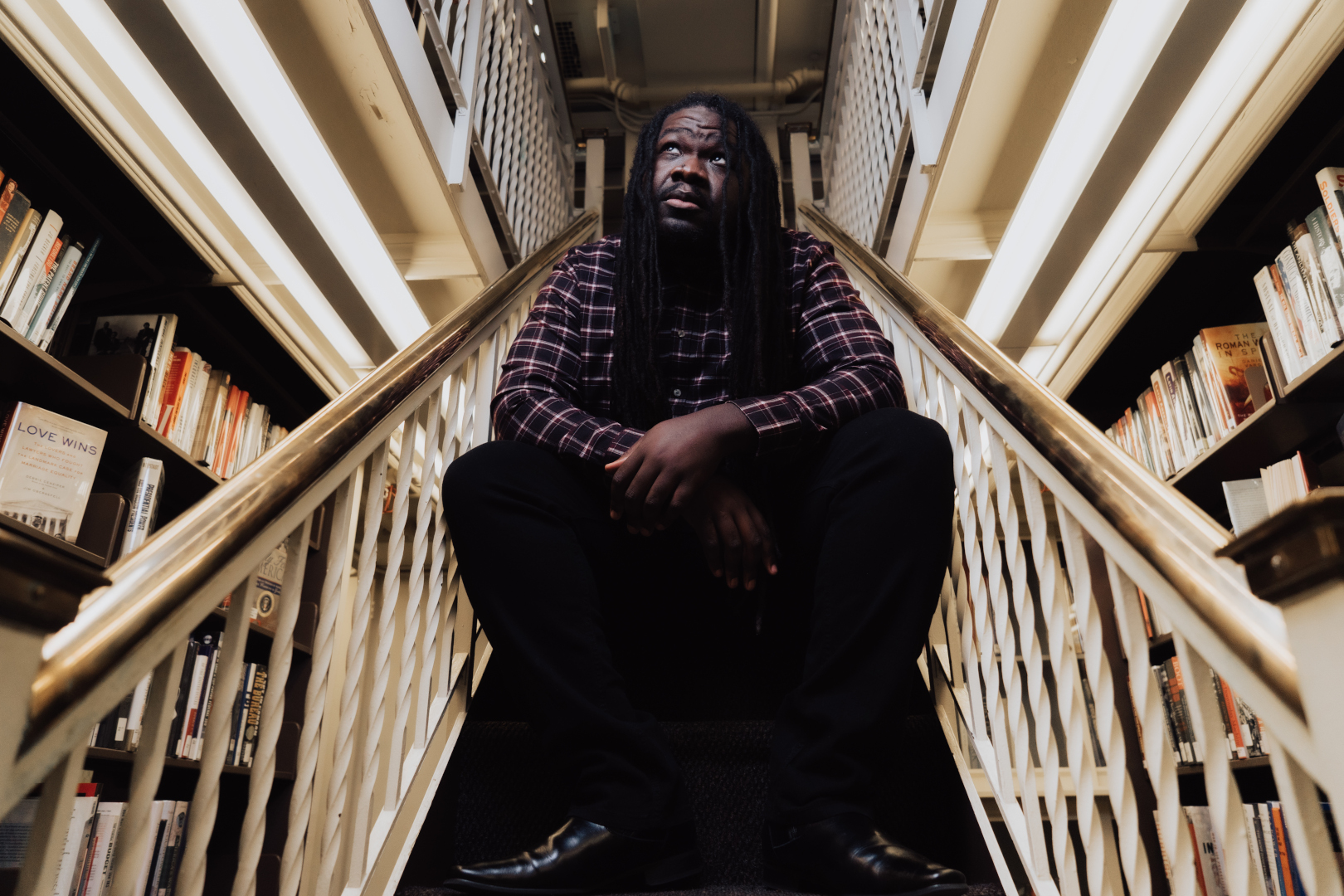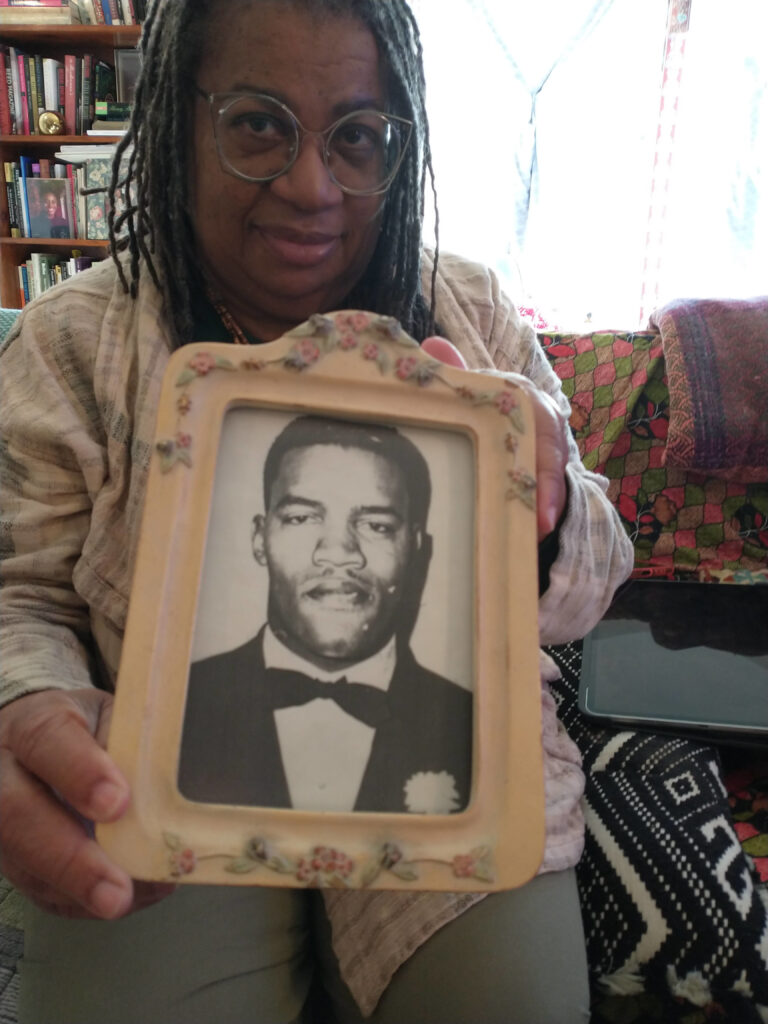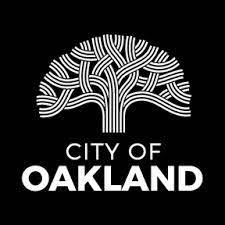
By Kevin Dublin

EXTERIOR. PROLOGUE ON OKLAHOMA PLAINS – ABOUT 40 MILES SOUTH OF TULSA – NIGHT
Grass, soil, and shadow: land crossed into by peoples of the CREEK NATION, the CHOCTAW NATION, the CHEROKEE NATION and their BLACK SLAVES.
Land crossed on a Land Rush of Sooners before their 20th century.
Before oil: there were hog, cattle, and horse ranches.
THEN: there was a BLACK MAN who knew many Indigenous Women
knew in another way their brothers,
knew in another way their land and trails,
knew how to scout for oil prospectors and tend.
THEN: there were corruption arrests and
there were deeds and responsibilities signed over for years and work.
THEN: there was a release and there were threats.
NOW: NEGATIVE FOUR WHITE MEN circle another man hunched over in a clump with his fist grappling to pull a grass sapling from the earth.
ALBERT HAYWOOD HART, THE FIRST (the first born, the first Black oil millionaire in Oklahoma, the first bled) reaches for the paper crumpled deed in front of him and pen.
WHITE MAN/ NEGATIVE 3
(with America on his lips)
See, we said we’d make you sign it
back over to us one way or another.
Albert picks up the pen, breaks it, spits his own blood onto the deed.
WHITE MAN/ NEGATIVE 2
grimaces, pulls another pen from his pocket, signs Albert’s name.
INSERT>>> Ms. Judy Juanita is an award-winning poet and short story writer, novelist, essayist and playwright. A Lecturer in the College Writing Programs at UC Berkeley, formerly a writing instructor at Laney College for nearly 30 years. She is a beginning who began after being begat by Albert Haywood Hart II & Marguerite Juanita Hart in 1946. This is but one braid of her stories:
INTERIOR. ALBERT HAYWOOD HART II – BORN IN BEGGS, OK – 1917 – DAY
This beginning begins in a town formed around an Oklahoma “Frisco” Stop.
What’s in the name? Destiny, but not a destination.
Beggs only made it somewhat Midwest to St. Louis,
but it was still called the San Francisco Railway
A generation later tickets farther West on that Frisco line
to another Pacific line and doodlebugs in-between,
a great Uncle chooses Berkeley because it’s the end of the line
then chain migration follows. But first, let us begin again:
Albert Haywood Hart, the second, on this earthly realm this time: 1917 – 1991.
INSERT>>> Ms. Judy Juanita said, “because my daddy was a race man, and usually that kind of person had to leave the South. They can’t stay there.”
He was a race man. And how did he become a race man? The Black man who grew up as a child with a music room the length of his whole adult Berkeley house. He bore witness. He opened his eyes, he ran.
They say, “a country is its people.”
How do you say, “don’t be afraid, but your country tries to kill you?”
How do you say, “don’t be afraid, but your country tries to kill itself?”
Grandfathers say, “they tried to kill me, but I’m okay.”
When a grandfather says, “okay’“
He’s saying, All of my blood wasn’t beaten out of me.
He’s saying, Suffering exists
When a grandfather says, they tried to kill me,
he means they’ll try to kill you, son.
They’ll try to kill you, granddaughter.
And you, yes, you.
They’ll try to kill you too.
When a grandfather says all of this,
he’s saying, you must be revolutionary.
INSERT >>> Ms. Judy Juanita said, “All of our parents did not want us to be hurt or killed. They understood the deadly nature of oppression better than the generations after understood. We, [meaning the Panthers] were a generation who came here. The children of Migrants in this Great Migration. Our parents came here, and all they wanted us to do was get an education because education was free here. When I started Community College, in Oakland City College, where I met Huey and Bobby, it was free. You just paid $2 a semester for your ID card … I maintain that the revolution…occurred here…it was a revolution, and we did make tremendous gains and changed this society. I think that the Black Panther Party saved democracy for another 50 years. Now we see it’s crumbling again, but we put it to the test at that point.”
INT. MARGUERITE JUANITA HART – BORN 1920 IN MUSKOGEE, OK – DAY
This beginning begins with the sound
of the lowest piano key letting up
into the air of church between the pews;
where worshipers pull them
into the shell of their ears, here:
Muskogee, Oklahoma, where azaleas
grow the most pink and violet,
where birds chirp like laughter,
where Ms. Marguerite learned to play piano,
where she graduated from Manual Training High School,
and where she kept her own heart
as she went to Langston University,
met her dear “Scottie” before
he had to leave and promise
I’ll be back for you. And in 1943,
they married while Scottie was on leave
as a Tuskegee Airmen in WWII.
And after his return, she moved
to join him in the Bay.
And what kind of way did they make? Did she make? She made it in the way she knew how, by maintaining her roots. Roots in her commitment to Christ and to the church. Roots in worship. Roots in fellowship. Roots in service: 40 years of typing and printing bulletins for a network of churches. Roots in the Langston Club, sharing with other alumni. What’s in the blood?
Some days they ask, “Habari gani?”
And we answer, “Umoja!”
Some days they ask ,“Habari gani?”
And we answer, “Kujichagulia!”
There is unity in the blood.
There is self-determination in the blood.
The blood is community.
INSERT>>> Ms. Judy Juanita said, “I so admire my mother and father’s generation and the generation before them because they came. They suffered, but they were such hearty souls, and they had those contacts that they never let go of: through the church, through their academic or HBCU connections, through region, through family.”
INT. JUDITH H. HART – BORN 1946 IN BERKELEY, CA – DAY
This beginning begins at 1232 Ninth Street,
after coming from Sacramento Street,
like the open beak of a California scrub jay
feeding young before their first squawk.
This beginning will be here about 90 percent
of this scrub jay’s lifetime. Before a small migration
to live in Oakland and build a nest for home
near garden apartments, in being too early to move
into East Oakland because of 99 year covenants
before they were broken when they only allowed
UC Berkeley students and white families.
Keeping close to the Cannery where beginnings
were almost welcome after World War II and during it,
when cheap labor in the munitions factories in Benicia
and Treasure Island were
where fathers worked. And after,
making a way the only way you know how:
ownership: creating a new beginning by owning
and operating a Black taxi cab company.
And where did this come from? And how? A household of strict Southern training. A household of a strict military father. A household of a mother’s words, passing family letters to little Judy Hart, to read aloud while dinner was being made, then a mother dictating replies to send.
Some say, “each generation must discover its mission, and fulfill it or betray it.”
And we are repeating Frantz Fanon.
Some say, “Revolution is not a one-time event.”
And we are repeating Audre Lorde.
Some say, “you have to decide who you are and force the world to deal with you, not with its idea of you.”
And we are repeating James Baldwin.
Some say, “We are pregnant with freedom.”
And we are repeating Assata Shakur.
Some say, “I am because you are.”
And we are repeating each other.
INSERT>>> Ms. Judy Juanita said, “Berkeley and Oakland were in one sense idyllic places because the weather is so beautiful. But I don’t remember the word racism when I was a kid. I remember the words segregation and white superiority. I remember those terms. But there was strict segregation in Oakland and Berkeley. International Boulevard used to be called East 14th Street. East 14th Street was the red line. It was very difficult for Blacks to, at one point, to move into homes, even if they had the money to move above East 14th— going from East 14th to the hills. I was clearly aware of that, but the Black community was so strong— that as children we lived a life beyond that segregation … We had friendships, social interactions, and there was always a degree of travel between Oakland and the South. You traveled back and forth, and this was car travel then. So we went to Oklahoma frequently every few years.”
Ms. Judy Juanita says, “Our parents fought for this.”
Let us say, “Our parents fought for this.”
“Our parents fought for this.”
Ms. Judy Juanita says, “We’re entitled to this.”
Let us say, “We’re entitled to this.
“We’re entitled to this.”
Ms. Judy Juanita says, “Our grandparents sacrificed for this.”
Let us say, “Our grandparents sacrificed for this.”
“Our grandparents sacrificed for this.”
Ms. Judy Juanita says, “We need change.”
Let us say, “We need change.”
“We need change.”
Let us say, “We demand change of the world, change of ourselves.”
“We demand change of the world, change of ourselves.”
Let us say, “We must be revolutionary.”
“We must be revolutionary!”


